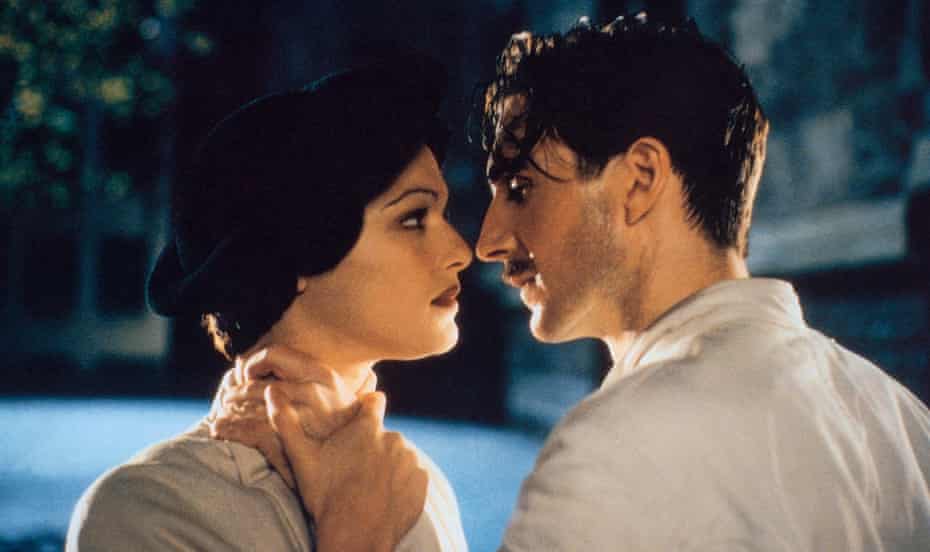This version of Dickens’s Great Expectations, scripted by David Nicholls, was maybe not groundbreaking but was watchable and featured Ralph Fiennes as the convict Magwitch. He is seen first leaping out and scaring Pip in the churchyard with a convict’s number-one cut and mud all over his face, and later with longish hair, clean-shaven in a mysterious, new respectable guise. It’s a transformation that should perhaps have given Fiennes more of a performing showcase.
Renowned Hungarian director István Szabó gave Fiennes arguably the biggest technical challenge of his movie career: to play three characters, three generations of a Hungarian Jewish family in the Habsburg empire’s final years. First: Ignatz Sonnenschein (German for “sunshine”) who changes his surname to Sors (Hungarian for “fate”) to avoid antisemitism. As his son Adam Sors, Fiennes is now a glamorous fencing champion, compromised by interwar fascism – and finally he’s the grandson: postwar Communist apparatchik Ivan Sors. It’s a bold triptych, foregrounding Fiennes’s darkly troubled sensitivity in the faintly exotic “European” manner that casting directors would often look for in him after his breakout performance in Schindler’s List. But Fiennes’s subtle performing style doesn’t really suit these theatrically stylised persona-shifts.
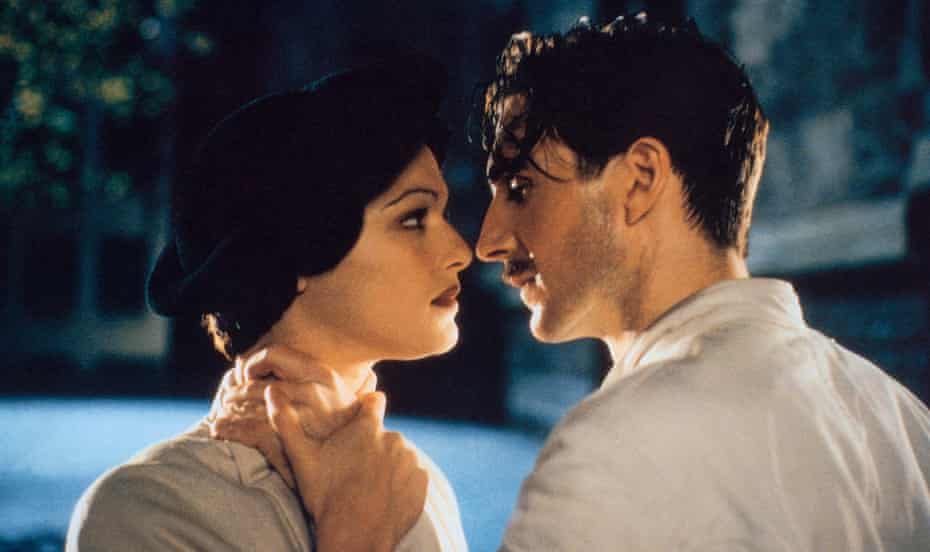
Impressively, Fiennes mastered Russian dialogue for this intelligent adaptation of Ivan Turgenev’s play A Month in the Country. Fiennes plays Mikhail, a gentle, cerebral and kindly man who has fallen hopelessly in love with a married woman, who is herself in love with someone else. Mikhail is shown to be complicit in a sneaky and dishonest plan to scare away his love rival, and Fiennes conveys all of Mikhail’s repressed sadness, repressed hope and repressed passion. It is the kind of Fiennes’s performance that divides the Fiennes fans and non-fans: some love the soft-spoken sensitivity, others find it a bit wet. But Fiennes always had charisma.
Gavin Hood’s robust and vehement intelligence thriller, taken from the true story of GCHQ whistleblower Katharine Gun (played by Keira Knightley), had Fiennes playing the human rights lawyer Ben Emmerson, who defended Gun. Emmerson finds himself up against his former colleague Ken MacDonald (Jeremy Northam), whose career had taken him another way, becoming the director of public prosecutions and seeking to put Gun away. Here is Fiennes in English establishment mode – see also The Constant Gardener – sensitive and soft-spoken as ever, with an injured but fiercely assertive liberal decency.
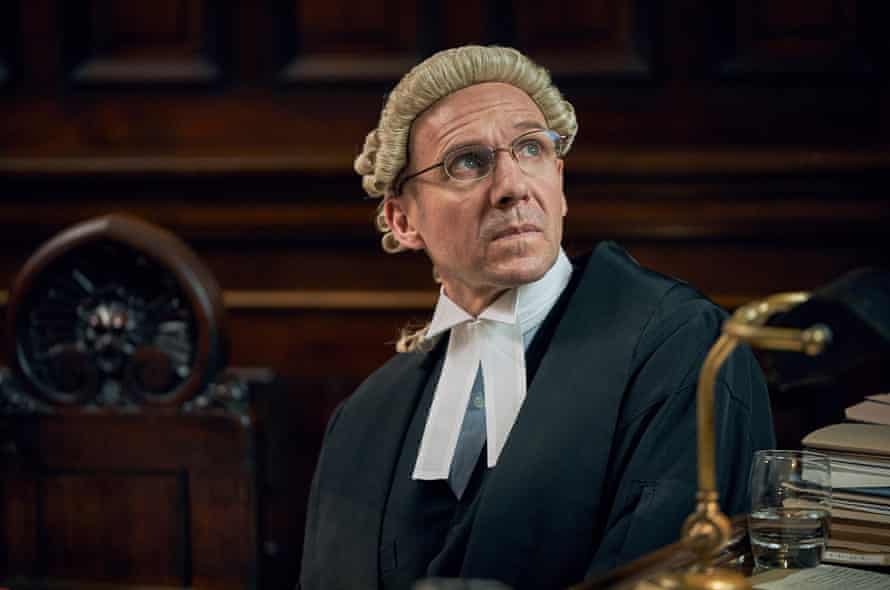
In the Coen brothers’ quirkily and slightly pedantically humorous and Wodehousian romp set in golden-age Hollywood, Fiennes plays the haughty director Laurence Laurentz, who is a European incomer to the US, like Curtiz or Sirk, but with a Britisher’s poise. So once again, Fiennes is playing the English-European variant, a combination utterly unique to him, and this is one of the times he has to play comedy, most particularly when his cravat-wearing auteur has to school Alden Ehrenreich’s dopey new star in how to deliver classy dialogue.
Here is the high-energy movie from Brazilian director Fernando “City of God” Meirelles that sought to put some dynamism and global sweep into a Le Carré drama. It gives us Fiennes in romantic mode. He is the thoroughly decent intelligence officer who finds himself falling for Rachel Weisz’s passionate political activist. They have midday sex after meeting for the first time, get married and then he has to investigate an establishment cover-up concerning his wife, which discloses the British government’s shabby dealings. It’s an attractive and sympathetic, if slightly subdued performance from Fiennes – perhaps tellingly, he is more tragically estranged from Weisz than full-bloodedly and romantically involved with her.
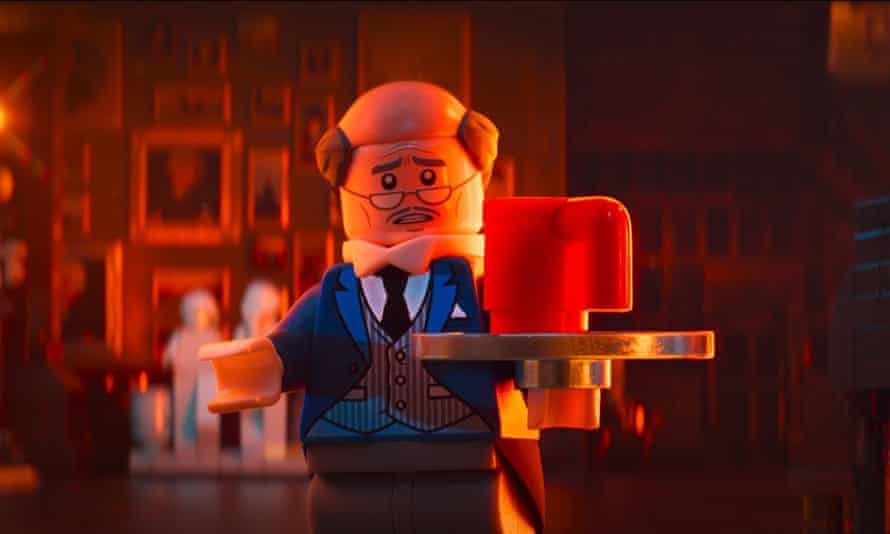
The entirely awesome Lego movies gave us this superb Batman drama, in which Fiennes voiced the role of Alfred Pennyworth, the devotedly Jeevesian butler to Bruce Wayne (Will Arnett) – the best of Fiennes’s animation voice roles. With admirable discretion and tact, his Alfred helps Batman/Bruce Wayne battle the Joker (Zach Galifianakis). Fiennes plays Alfred absolutely straight and this role opens up a continuing debate among Fiennes fans: can Fiennes play comedy? Does he get it? Or is this deeply serious actor just being a good sport and allowing his natural or even humourless solemnity to be used for ironic purposes? I think it’s the former – see the No 4 and No 1 slots below.
Here is the 007 movie in which Fiennes had the highly unenviable task of following Judi Dench in her showstopping incarnation as spy-chief M, the oedipal matriarch of Bond and all the other spies, treating them mean and keeping them keen. This is Fiennes in establishment mode and also cameo mode, in which the sheer concentration of his reputation and presence is given us in small doses. Surely M was the part Fiennes was born to play (perhaps never quite right for Bond, not brawny enough or uncomplicated enough – though probably ruthless enough) in his suit-wearing, Pall-Mall-club-membership-having establishment style. This is the M who would show a talent for working at his massive desk (“Come in, 007”), sitting at it, irritably leaning over it, occasionally coming out from behind it to berate Bond or show him top-secret documents.
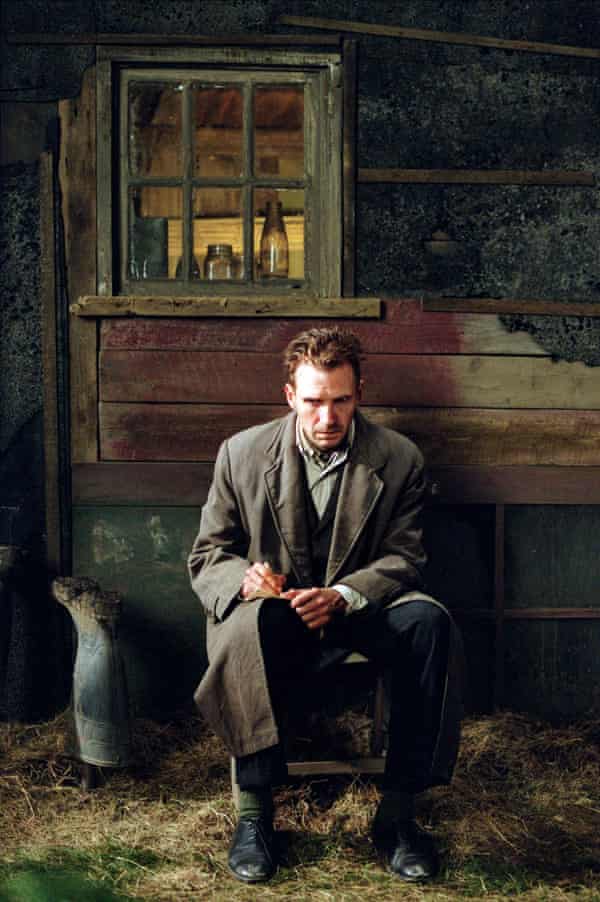
Fiennes goes into lower-class mode to give us a mannered, fascinating performance as Spider in David Cronenberg’s movie, taken from the Patrick McGrath novel. He is a troubled middle-aged man, just released from a long-term psychiatric facility and allowed to stay in a grim boarding house in King’s Cross, London (in that locality’s pre-gentrification era, before it became the home to Google, the Crick Institute and indeed the Guardian). Spider revisits the haunts of his childhood and disappears down a rabbit hole of obsessive fears about his past. This is a stammering, mumbling, wincing and flinching performance as poor traumatised Spider, and it’s a strong dose of undiluted Fiennes – stronger and more intense than the performances he shows us these days. Whatever your taste, it shows his real charisma and screen presence.
11. The End of the Affair (1999)
As with Le Carré, Graham Greene is the perfect author for Fiennes, and in some ways it’s a surprise that Greene hasn’t featured more on his CV. Writer-director Neil Jordan’s adaptation of Greene’s novel has grown on me a lot since I first saw it, and Fiennes is just right as Bendrix, the gloomy mid-list literary author who once had an affair with a married woman called Sarah (Julianne Moore) in wartime London. He finds his obsession with her flaring up again years after the event when her cuckolded husband innocently confides in him that he thinks Sarah is cheating. Fiennes brings a wonderful maturity and complexity to the role: a jaggedness, a simmering amour propre, a neurotic obsessiveness, an importunate yearning. It has something of Dirk Bogarde, but very Fiennes.
Respect has to be paid to Fiennes’s performance as he who must not be named (or at least not named until quite late into the franchise) – the evil Lord Voldemort. No one but Fiennes could possibly have taken the role; no one else had that combination of icy psychopathic detachment and evil-Brit cultural prestige. (Maybe Anthony Hopkins in Lecter mode, but he would probably have been better as Dumbledore.) Fiennes’s digitally assisted facial makeup is unforgettable: the ashen-white face, billiard-ball smooth head and disappearing nose. A cynic might say that this is the caricature version of Fiennes’s own features, but his personality was certainly transmitted through the nightmare of this satanic face, with nostrils flaring blankly under the smouldering eyes. This final Potter film gives Fiennes a speech of Shakespearian clamour in the ruined courtyard. One to savour.
Fiennes’s latest performance is one of his best, and it’s a shame he’s not more central in the film. This is based on the true story of the Sutton Hoo archaeological dig in 1939. Fiennes plays Basil Brown, the self-taught working-class Suffolk man who was responsible for the most sensational archaeological find in British history, and Carey Mulligan the widowed landowner on whose property the dig took place. Sometimes, Fiennes’s “lower class” mode can be a little mannered and quaint, but his Basil is commanding and convincing. He is a tough, self-reliant man of few words and an outdoor tan who knows his worth, while deeply English in his reluctance to talk about his feelings. It’s a mature performance from Fiennes in that there is no intensity or grandstanding.
Anthony Minghella’s Leanian-epic love story, taken from the Michael Ondaatje novel, put Fiennes definitively on the A-list and gave us so many of the elements of his performing style. There was the tortured romantic; the exotic and mysterious English/European hybrid image with doomily erotic allure; and there was the abyss of darkness and wartime pain that was to be forever associated with him. Juliette Binoche plays the nurse in Italy who is caring for the badly burned man, known as the “English patient” (Fiennes) but who is revealed in flashback to be an impossibly handsome and cultured Hungarian aristocrat, who flew airplanes over the desert (as heroically as Peter O’Toole’s Lawrence piloting camels) ostensibly to help with map-making for the Royal Geographical Society, but really for British military intelligence. He falls passionately, and yet at the same slightly diffidently, for a married woman – as Fiennes was endlessly to do in the movies afterwards. This was Kristin Scott Thomas, whose own erotic froideur was a great match for Fiennes.
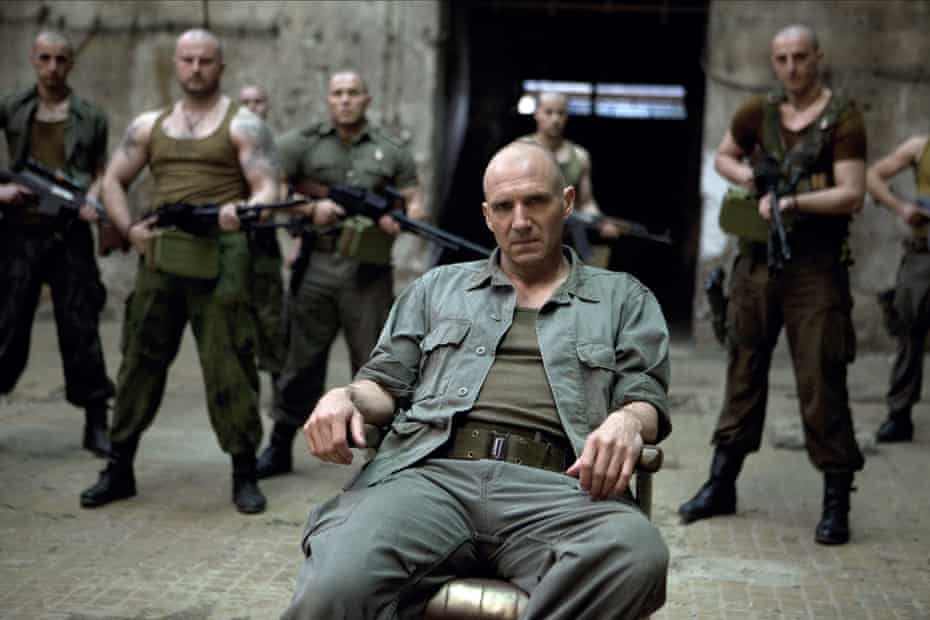
As the director-star, Fiennes brought a fierce critical intelligence for this fine adaptation of Shakespeare’s least loved Roman play. Fiennes is the shaven-headed and fanatical military man who is at first loved by the fickle public for his magnificent battle against the Volscian army. Then, having been persuaded to run for civilian office as a consul and effectively forced into exile by the plebeian mob, in bitterness he puts himself at the service of that same Volscian enemy. Fiennes’s dead-eyed, dust-encrusted, blood-smeared face and mesmeric stare make him look weirdly like Klaus Maria Brandauer in Szabó’s Mephisto – or, of course, the demonic Voldemort himself. Fiennes’s line readings bring out that distinctively light, delicate voice, verging on the nasal, which can so suddenly harden into threat.
Fiennes brought his A-game to this cracking black comedy from Martin McDonagh in which two Dublin hitmen called Ken and Ray (played by Brendan Gleeson and Colin Farrell) find themselves told to lie low – in Bruges, of all the baffling places – after an unsuccessful mission. It is there that they must await further orders from their sinister cockney boss, Harry, played with a variety of quaint glottal stops and Pinteresque menace by Fiennes. Soon it becomes terribly clear to Ken, but not Ray, what the new job is going to be. Like Ben Kingsley in Sexy Beast or John Osborne in Get Carter, Fiennes was gifted a juicy bad-guy role of the sort that comes along very rarely, and he squeezes every noisome drop out of it, fronting up deadpan confrontations with all sorts of tough guys who don’t realise until it’s too late what a right lairy bastard Harry is. And it’s especially tense when the exasperated Harry actually has to leave England and come out to settle things with Ken and Ray, in Bruges.
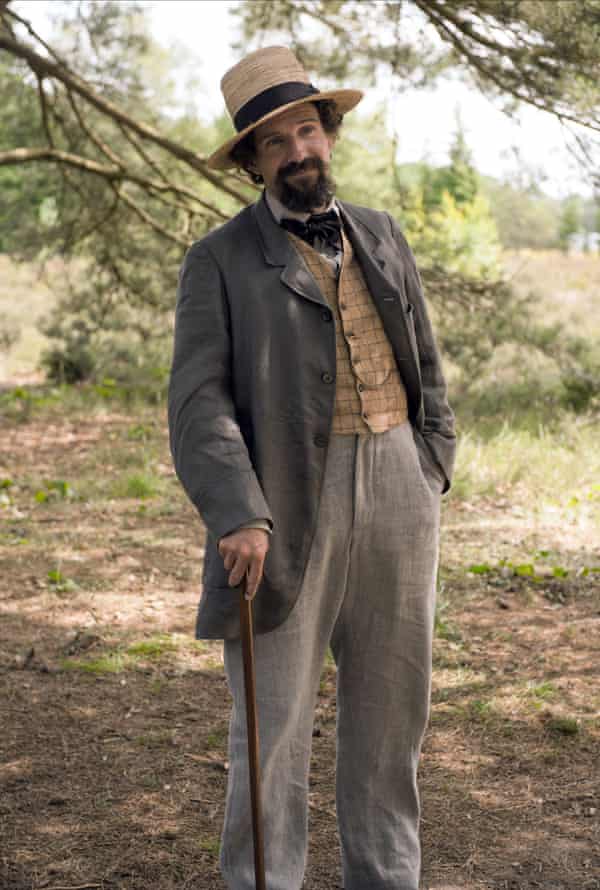
Here is the second of Fiennes’s directorial outings on this list and it is his piercingly intimate and perceptive account of Charles Dickens and his relationship with his secret lover, Nelly Ternan (played by Felicity Jones), and his neglected wife, Catherine (Joanna Scanlan) – taken from the Claire Tomalin biography. Fiennes’s onscreen presence, sometimes a bit desiccated and chilly, is here richly sanguine and even rather exuberantly conceived, playing Dickens as the preening peacock of emotional pain. Fiennes portrays a complex figure: a showman, an egotist, an applause-addict with a staggering literary productivity who has become accustomed to the prerogatives of global celebrity and being what we would now call a national treasure. Fiennes shows us someone who expected his lovers and children to be his enablers, but who is also a genuine artist and social idealist, whose entire, remarkable career may in fact owe something to sexual frustration and displacement activity. Kristin Scott Thomas played Fiennes’s lover in The English Patient in 1996 when they were respectively 36 and 34 – but in this she has to play the mother of Fiennes’s lover, cynically allowing her Nelly to be seduced by the great man.

Fiennes is known for his refrigerated restraint. But when he goes over the top, he goes royally and stratospherically over the top. And so it proves here, in this simmeringly sexy poolside movie, loosely based on Jacques Deray’s 1969 film La Piscine. Fiennes shares the screen with Tilda Swinton, Matthias Schoenaerts and Dakota Johnson and upstages all three of them. Swinton is Marianne, a mega-famous music star who is at this gorgeous villa with her new partner, Paul (Schoenaerts). Then her ex-lover shows up, Harry (Fiennes), a record producer who is an old-style alpha male, a toxic narcissist and exhibitionist, bipolar but with no “down” phase, unable to stop talking, name-dropping about the music stars he’s mates with, cracking aggressive jokes, boozing and hellraising, and always trying to get his kit off for skinny-dipping in the pool. He has brought along his pouting, entitled daughter (Johnson). Fiennes conveys Harry’s insecure refusal to admit that Paul has supplanted him in Marianne’s affections and there is something tragic and desperate about him. But he is in danger of overbalancing the entire film: this is a rock’n’roll performance from someone who is usually happier with piano sonatas.
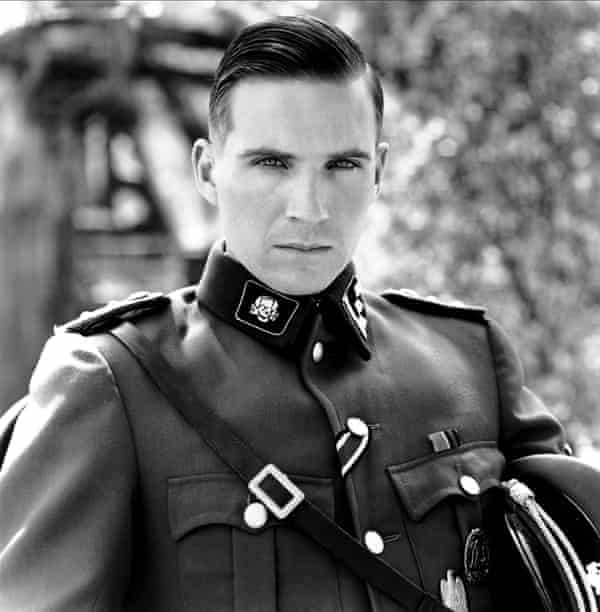
Before this film, Fiennes had been known for some distinguished stage work at the National Theatre and the RSC, and possibly for his film debut as Heathcliff opposite Binoche in Wuthering Heights in 1992. But what exploded him into international stardom was his chillingly persuasive performance in Steven Spielberg’s Schindler’s List. Based on Thomas Keneally’s book Schindler’s Ark, it is the true story of Oskar Schindler (played here by Liam Neeson), the German industrialist who was mysteriously converted from cynicism to idealism, and saved thousands of Jews from the camps by employing them in his factories. Fiennes plays the SS officer Amon Göth, a Nazi who is an exemplar of pure evil: hypocritical, banal, smug, preening and cruel. Schindler has to try flattering him out of his habit of wantonly executing Jews in the prison yard, by appealing to his “good” side and even trying to persuade him he might be known as “Amon the good”. Fiennes shows us the conceit, followed by the querulous selfishness, with which Göth briefly wrestles with the idea that he might actually want to be good. Fiennes’s finely wrought looks, his staring eyes, flaring nostrils and fastidiously wincing mouth made an enormous impression and to some extent influenced his screen persona from that day to this.
2. Quiz Show (1994)
One of Fiennes’s finest, subtlest and most heartbreakingly sad peformances. This is based on the true story of Charles Van Doren, the diffident intellectual and minor college lecturer who became a huge TV star in the 1950s, an era in which the US was still not used to such things. He was a contestant on a quiz show called Twenty-One, in which this clean-cut Wasp dislodged the reigning champion, an insecure working-class Jewish guy played by John Turturro. But the awful truth was that both men were fakes: they were being fed the answers by cynical producers, who were creating something as phoney as any soap opera. But both men were quite as addicted to fame and success, and both had been quite content to go into denial about the reality behind their reality TV – until it was revealed by a Congressional investigation. There is something cringe-makingly fascinating in the scene when Van Doren, newly famous due to his TV stints, arrives outside college in a cab and preens himself for all the adoring co-eds, while affecting to be bemused by mere television success. But finally he has to confess the dishonesty to his father, a revered author and scholar played by Paul Scofield. It is agonising – and interesting also to see Fiennes playing opposite a true thespian master.
This is Fiennes’s masterpiece (and probably Wes Anderson’s as well), proving that he absolutely understood comedy, and could play it to the hilt, if only someone would give him the chance. Fiennes is Gustave, the legendary 1930s concierge of the Grand Budapest Hotel, a name that incidentally reinforces Fiennes’s periodic career association with Hungary, though the hotel is situated in the fictional central European state of Zubrowka. (The staggeringly large, ornate interior was in fact the Görlitzer Warenhaus, an abandoned art nouveau department store building that Anderson had discovered in the east German town of Görlitz.) The preposterous Gustave is energetic and exacting, taking a passionate pride in the high standards of his establishment and ruling the staff with a rod of iron. Like them, he is kitted out in a Ruritanian livery – a purple tailcoat with dovegrey waistcoast and trousers – that matches the hotel’s decor. Despite the quasi-military correctness of his bearing in dealing with his subordinates, Gustave can also lapse into high-camp familiarity with the guests; he affects an air of genial worldliness and deferential intimacy with the hotel’s grander clientele.
But it is to the humble lobby boy, poignantly named Zero (played by Tony Revolori), that he confesses the secret of the hotel’s profitability: a string of wealthy old ladies who return year after year because he services them sexually, including the ancient Madame D, played with heavy prosthetics by Tilda Swinton. But Gustave becomes involved in a bizarre criminal conspiracy. Fiennes brilliantly tackles the Lubitschian comedy of it all, running from the police in one uproarious scene away from the camera in deep focus across the hotel’s gigantic lobby area and up the stairs. Later he will be a similarly dapper prisoner in convict’s garb. Fiennes’s performance is superb, a cousin, perhaps, to Bogarde’s haunted fugitive in The Night Porter, but with a sense of humour. The Grand Budapest Hotel is a delirious operetta-farce; Fiennes’s performance is the helium keeping it airborne.

